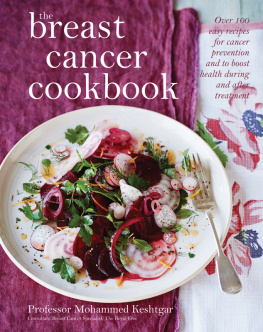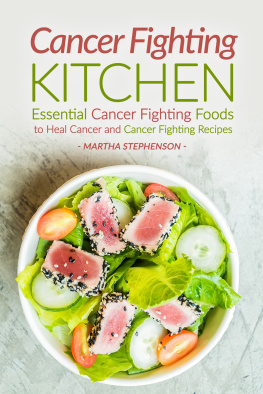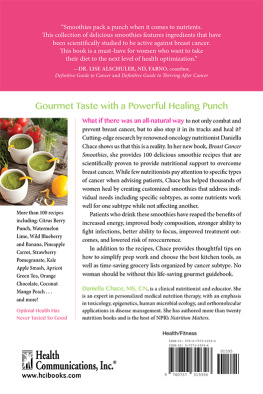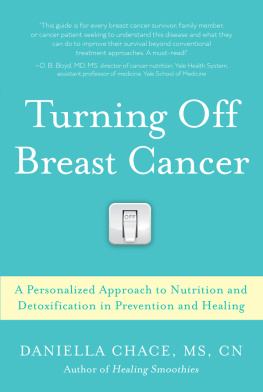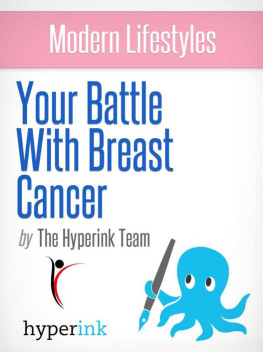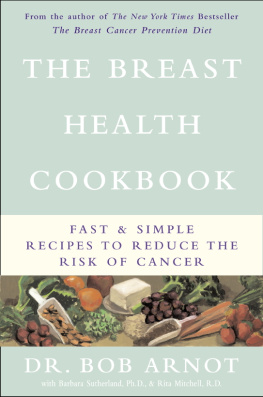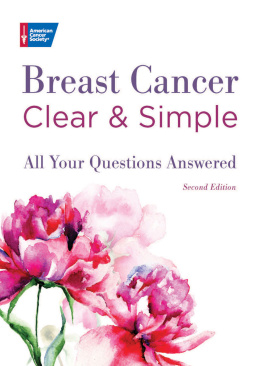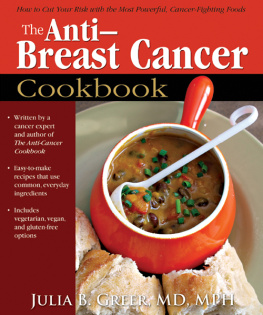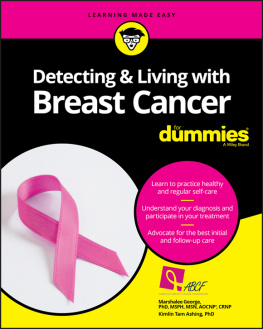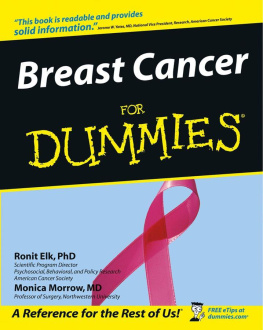Recipe notes
All recipes have been analysed for their calorie, total fat, saturated fat, sugar and salt contents per 100g and per portion to ensure they are appropriate for inclusion in a healthy balanced diet.
All spoon measures are level unless otherwise stated:
1 ts = 5ml spoon;
1 tbsp = 15ml spoon.
Please use fresh herbs and freshly ground pepper unless otherwise suggested.
Use medium eggs unless otherwise suggested. Anyone who is pregnant or in a vulnerable health group should avoid recipes that use raw egg whites or lightly cooked eggs.
If using the zest of citrus fruit, buy unwaxed fruit.
Timings are guidelines for fan-assisted ovens. If you are using a conventional oven, set your oven temperature approximately 15C (1 Gas mark) higher. Use an oven thermometer to check the temperature.

Contents
I have found that as soon as a patient is informed of a breast cancer diagnosis, the majority like to take an active role in their treatment. Diet and lifestyle are two aspects they can modify immediately and with relative ease.
You may be reading this book because you have been diagnosed with breast cancer, either recently or a while ago, or you may feel that you have a higher risk of developing it, perhaps because you have one or more relatives with breast cancer. Or you may be fit and well and simply are concerned about your health in some way. I was motivated to write this book in collaboration with my colleagues as I have become increasingly convinced that diet and lifestyle are contributing factors to the development of cancer.
Over the years, I have met and treated countless women, and some men, with breast cancer. In my experience, when a patient is informed of their breast cancer diagnosis, after a short period of getting over the shock of the news, the majority would like to take an active role in their treatment. They find loss of control difficult to bear and they would like to regain that control. I am asked to advise them on what they can do to help them fight the disease. Diet and lifestyle are two aspects that they can modify immediately, and with relative ease.
Many feel empowered to take responsibility for themselves. This also helps them to go into fight mode and psychologically feel better about themselves and their treatment. This experience is coupled with the fact that there have been major advances in the effective treatment of breast cancer. Being diagnosed with the disease is not all doom and gloom and the majority of our patients make a full recovery after treatment.
Approximately 30% of cancers and their sequelae are influenced by five behavioural risk factors: dietary intake, high body mass index, low fruit and vegetable intake, lack of physical activity, tobacco and alcohol use. No single factor is causal or protective, and many factors interplay in some way.
Eating and drinking are an integral part of our lives. We are what we eat and our lifestyle can contribute to our general well-being and also to the development of cancer. We are also able to modify our diet and therefore alter the risk of developing cancer, including breast cancer. Changes in dietary patterns are not only related to a reduction in the risk of developing breast cancer, there is also evidence that breast cancer recurrence rates are reduced and survival is improved when patients diagnosed and treated for breast cancer adopt a healthy lifestyle.
Approximately 30% of cancers are influenced by behavioural risk factors, including dietary intake, being overweight, low fruit and vegetable intake, lack of physical activity, tobacco and alcohol use.
It is estimated that as many as 9% of cancer cases may be prevented by individuals changing their diet. Research also suggests that about 5% could be avoided by maintaining a healthy body weight. Of course, it takes time to change your diet, certainly for you to be content with that change, and for it to become lasting. If, for example, your diet has been low in fruit and vegetables, yet high in sugary foods such as cakes and biscuits, and you are looking to reverse that balance, it will take time for your appetite to adapt but adapt it will, if you are motivated and persistent. It follows that the consequent improvement to your health and well-being will also take time.
What is breast cancer?
Normal tissues are made up of cells of different types that are arranged to form an organ, such as a breast. It is the DNA that controls what happens in the cell. When the DNA changes (a process called mutation), it leads to cells starting to grow out of control and ultimately results in cancer.
Breast cancer is by far the commonest cancer in women. Worldwide, more than 1.5 million women are diagnosed with breast cancer every year. The majority of women develop breast cancer after their menopause, but about two out of every ten patients are under 50 years of age. The risk of developing breast cancer for a woman who lives to 85 years of age in the UK is currently 1 in 8. Thanks to significant developments in medicine and the biomedical sciences, more than 85% of the women diagnosed with breast cancer remain alive and well 5 years after their diagnosis.
Breast cancer risk factors
Breast cancer is a multi-factorial disease and although its causes and natural history remain unclear, epidemiological research indicates that genetic, biological, environmental, dietary and lifestyle aspects are amongst the risk factors for the disease.
Key risk factors include the individuals reproductive history. For example, exposure to a greater number of menstrual cycles, that is to say early-age onset of menstruation and late-age onset of menopause, as well as having fewer children, are risk factors. Being overweight and consumption of alcohol are also amongst the risk factors. The underlying reason for this increased risk is the exposure to the female sex hormone oestrogen; this hormone is known to bind to a receptor molecule in breast cells and drive cell division. Increased cell division increases the chance of an individual developing breast cancer. Preventing long-term exposure to oestrogen reduces the risk of breast cancer.
Breast cancer risk factors include exposure to a greater number of menstrual cycles, taking HRT, having fewer children, lack of breast feeding, being overweight, consumption of alcohol and inheriting a faulty gene.
HRT (hormone replacement therapy) involves taking female sex hormones to replace hormones that your ovaries no longer produce after menopause. It is mainly taken in order to reduce the symptoms of menopause like hot flushes and lack of energy. Taking HRT increases the risk of developing breast and ovarian cancer. The longer you take HRT, the more your breast cancer risk increases. The good news is that if you are already taking HRT and have decided to stop, your risk of cancer development will revert back to normal within 5 years of stopping it.
Aside from reproductive history, inheriting a faulty (mutated) gene is responsible for approximately 510% of all breast cancers. The most common of these are the BRCA1 and BRCA2 genes. If you have a faulty gene, it doesnt mean youll definitely develop breast cancer, but you are at a higher risk. Out of every 100 women with a faulty gene, between 50 and 85 of them will develop breast cancer in their lifetime.

